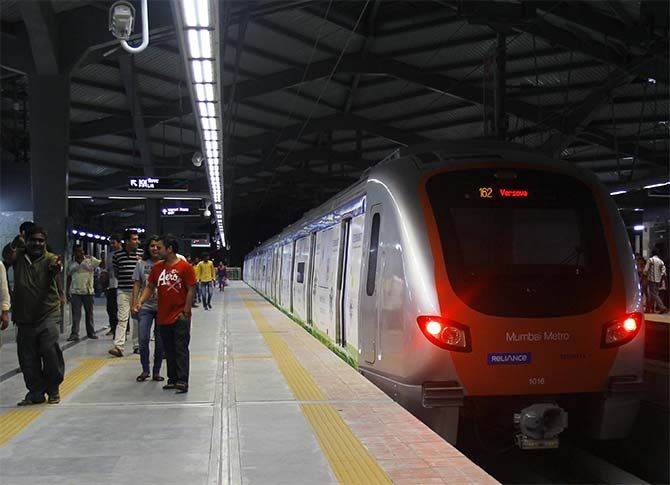
Mumbai Metro is branding its way into the commuters' daily routine; a novel idea for a city always on the move
Raju Ganeshan, 27 works for an information technology firm in Mumbai.
He is one among millions of young commuters who regularly take the metro to work.
But on Monday (8 June), he was in for a surprise.
As he got off the train, a team from Mumbai Metro One, the consortium that manages the metro line, was waiting for him, garland in hand ready to crown him Metro Hero.
Similarly, Neeta Gokhale, a young executive with a five-star hotel was felicitated as Metro Heroine.
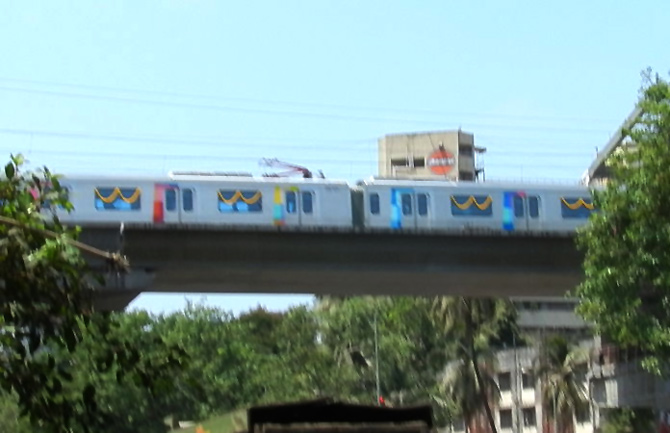
Mumbai Metro One is sparing no effort (and money although they refuse to put a figure down) to drive home the transformative power of its 11.4 kilometre line that connects what are, arguably, the messiest and most congested parts of the city.
Hoardings at key spots, radio jingles and performances at the metro stations -- for the first time an Indian public transport facility is beating its own drum and letting the commuter know how it can impact her life.
Mumbai Metro One is a consortium between Reliance Infrastructure Limited (69 per cent), Mumbai Metropolitan Region Development Authority (29 per cent) and Veolia Transport SA of France.
The company says that it spends about Rs 55 lakh (Rs 5.5 million) every day to maintain the system and car depot.
In the one year that it has been around (2014-15), 92 million commuters have travelled by it.
The company earned Rs 136 crore (Rs 1.36 billion), but incurred losses of Rs 191 crore (Rs 1.91 billion).
It makes about Rs 13 crore (Rs 130 million) through leasing space -- it has 52 stalls spread over its 12 stations.
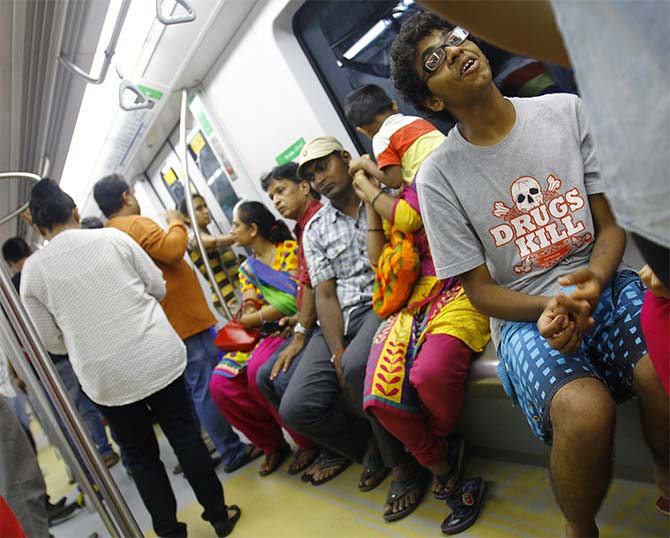
Public utilities rarely advertise, especially in India where private participation is minimal.
Mumbai Metro is among the initial clutch of companies that have ventured into the space and it is keen to build loyalty and widen its user base.
The company says that its trains have run 1,30,000 trips so far with more than 99 per cent efficiency.
It has covered 1.4 million kilometres and at present, an average of 263,000 commuters use it on weekdays.
The aim, of the ongoing Mumbai Metro One campaign, is to use the goodwill that it has generated to build a strong brand and also get more people to use its services.
So how does it do that?
The way the campaign has been conceived, the company says, it is meant to address the common concerns of the city’s regular commuters.
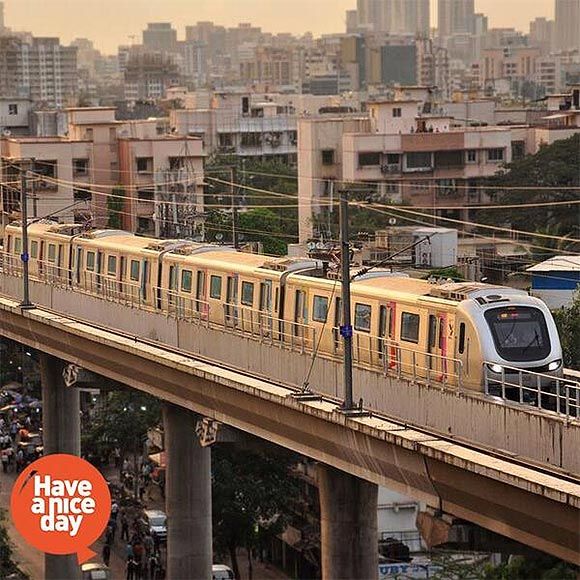
Named Time Lelo, the concept developed by an in-house team positions the metro as a way to save time, the most expensive commodity in the city today.
And it highlights something that no other mode of public transport can offer: clean and comfortable travel.
The company spokesman says, ‘the awareness campaign uses typical Mumbai lingo, like that of a hawker selling things in an interesting manner and that’s where the concept of Time Lelo Bhai Time Lelo was born.’
The ads also use the line, Mumbai Metro Meri Jaan, Safar Ki Hain Yeh Shan (the metro is my life, it is the high point of my travel).
The spokesperson says that since optimism is the essence of the metro, these lines are meant to convey and highlight the same for the commuter.
The aim, the company says, is to position the metro as a benchmark for intra-city travel experiences in India and to let the people know how it is bringing a world-class service to their doorstep.
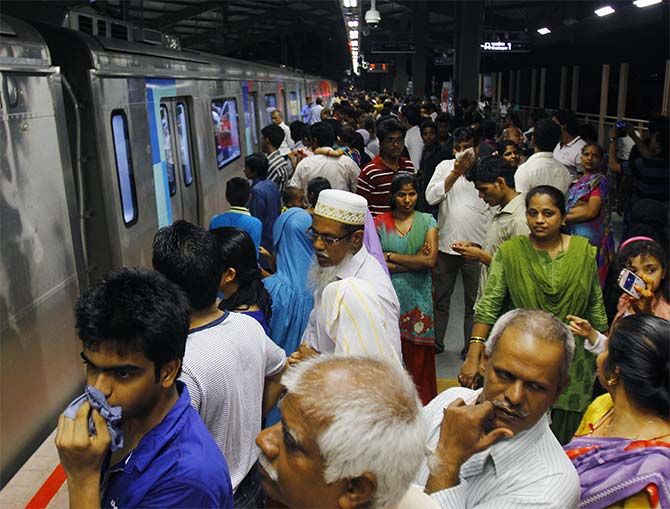
The metro commuters are quick to agree.
N Srinivasan, a 70-year-old retired executive who rides the metro thrice a week to visit his stock broker says he is a fan.
He has stopped using his car ever since he boarded the metro.
“We offer air-conditioned trains that are technologically superior”, the company says. Also the stations are disability friendly, clean and aesthetically designed.
“It is also safe and there is a facility whereby any commuter can speak to the train pilot in the moving train’’, according to the company spokesperson.
The company wants commuters to associate, efficiency, cleanliness and ease of travel with the brand.
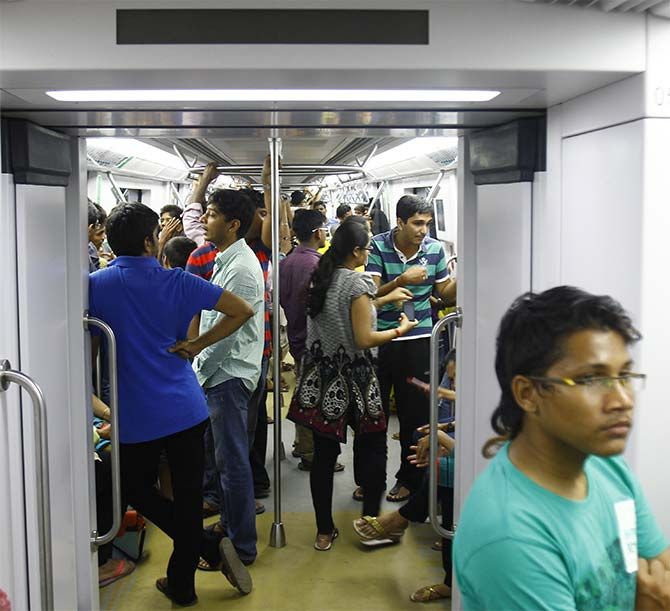
So, apart from advertising and other such initiatives, it also runs an extensive training and development programme for employees.
It has launched a cleanliness drive that pits employees against each other for an award for the cleanest, safest and most efficient stations.
Taking a cue, perhaps, from the hugely successful manner in which the Mumbai International Airport has showcased Indian art and culture, the company invited through the Majhi Metro festival in 2013 works of art and public architecture pieces. Today each station is home to the award winning works.
In the second season photographers across the city have been asked to submit their best photographs.
These are being used to set up a gallery at one of the stations.
The idea is to make commuters feel that they are a part of the metro eco system. And if the company is still unable to get this message through, it can go back to good old Bollywood.
The metro has been a part of several movies and will be featured in many more -- the commuter is not complaining.
Snapshot
- Total revenues: Rs 136 crore (Rs 1.36 billion), incurred losses of Rs 191 crore (Rs 1.91 billion)
- Revenues through leasing of station space: Rs 13.1 crore (Rs 131 million)
- Over 92 million commuters
- More than 1,30,000 trips
- Distance travelled: Over 1.4 million km
(All figures for 2014-15)













 © 2025
© 2025